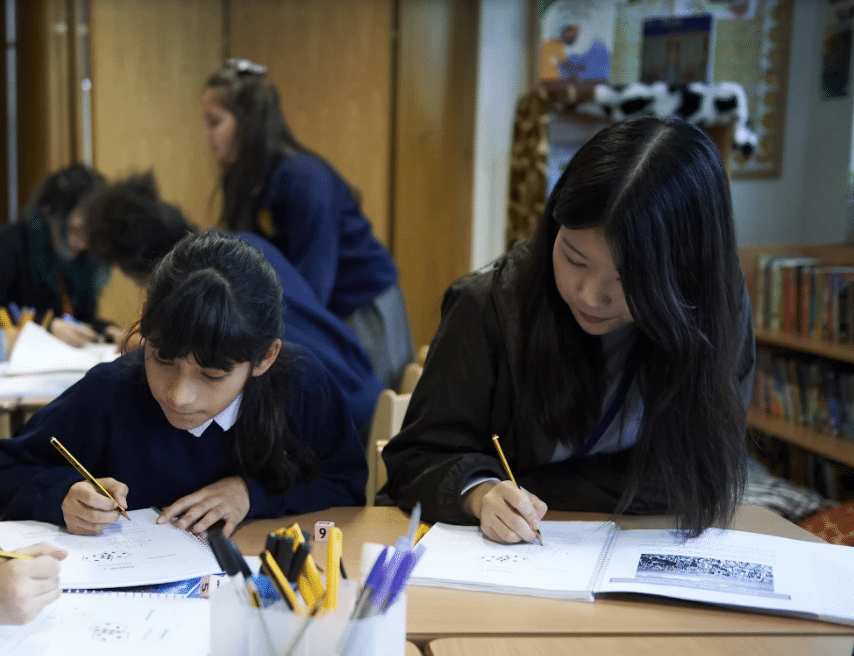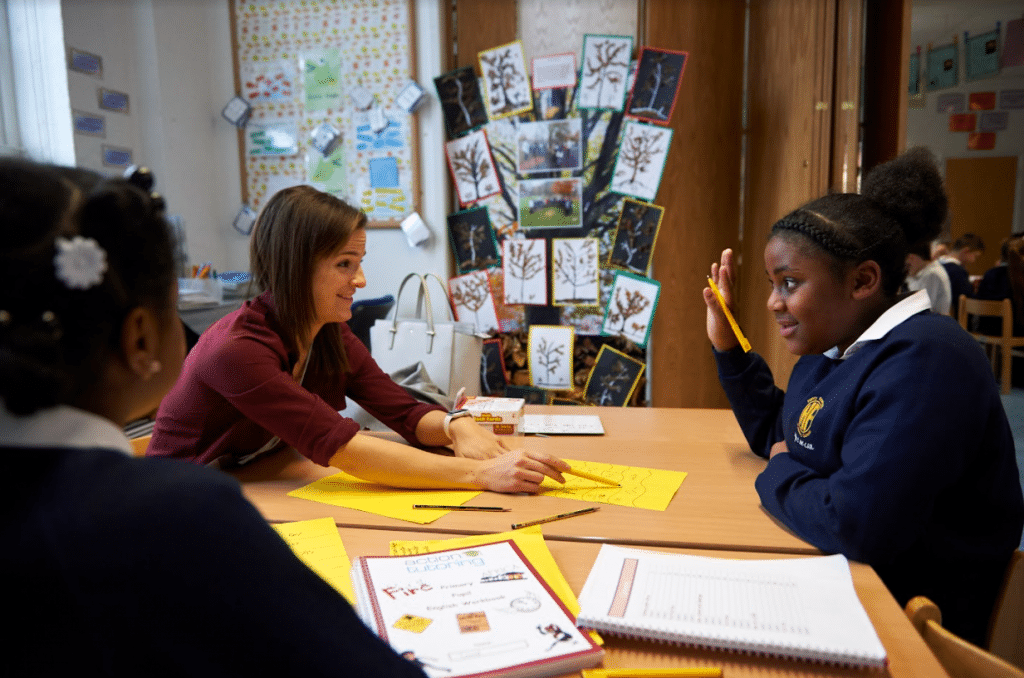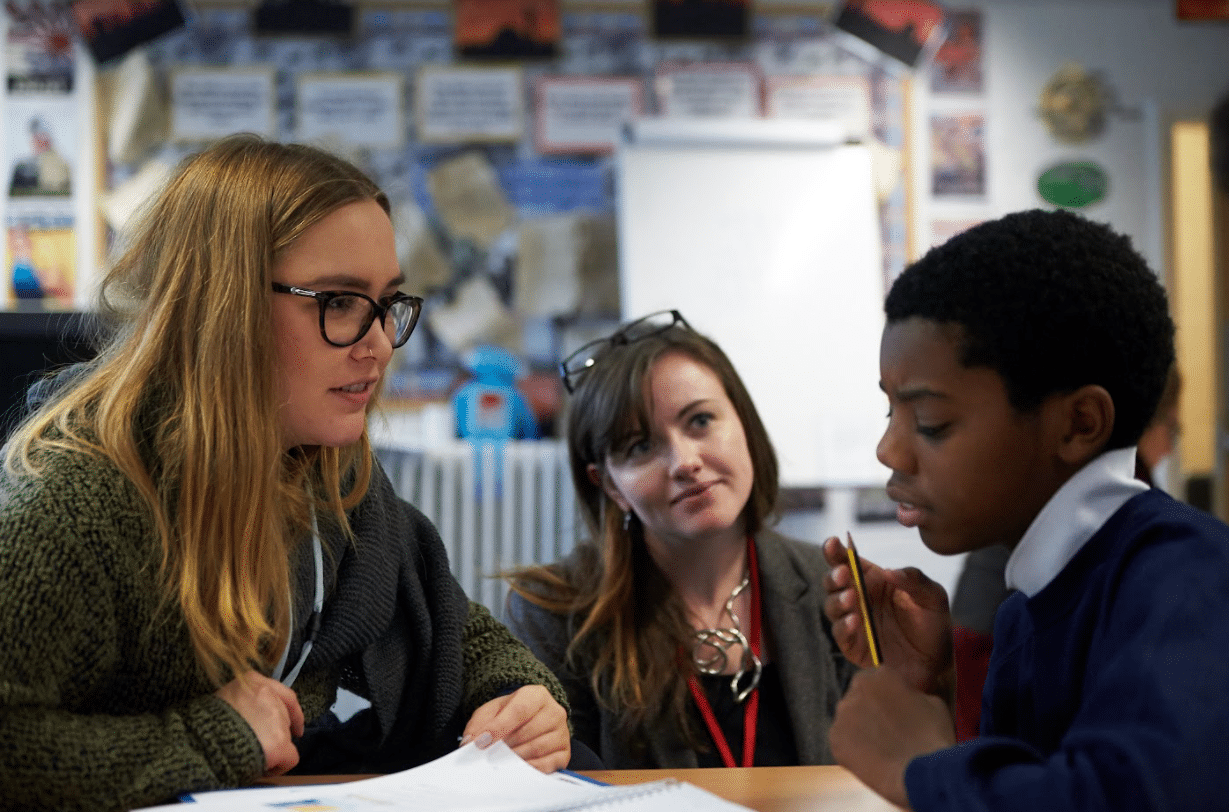Struggling to engage your pupils in tutoring sessions? This guide will help!
27 May 2022
At Action Tutoring we believe every pupil has the potential to achieve academic success under a supportive environment, using the right tools and resources.
We are proud to have such amazing volunteer tutors, who are passionate about helping disadvantaged pupils reach their full potential.
When they sign up to a programme, many of our volunteers are tutoring or working with children for the first time. With the help of our Programme Coordinators and the workbooks we provide, they are equipped to make tutoring sessions interesting and engaging.
We want to make sure that all our volunteers feel confident before starting their programme. For this reason, we’d like to share a few tips that help pupils to be more engaged during your tutoring sessions.

Shy pupils
How do you engage shy pupils? Some children take time to get comfortable talking to a stranger. As a tutor, it’s great to put in some extra effort by asking them questions and giving them some information about you. This will encourage them to feel more comfortable sharing with you and speaking about themselves. Persevere, and look for small wins each week.
Read more: How you can support your pupils’ mental health as a tutor

Pupils with low self-confidence
You can start by adjusting what you consider ‘good work’ to the starting point of your pupil’s ability. For example, writing a full paragraph with correct punctuation will not get them a grade 5 in GCSE but it may well be a big step forward for them personally.
At the end of the session, explicitly show pupils the progress that they have made. Don’t forget to show them what they can now do that they couldn’t at the start of the session so that they leave with a sense of achievement!
When working with pupils who lack confidence in your subject, make sure to praise effort over correct answers. If you have a couple of minutes, you can watch the video by Carol Dweck’s study into growth mindsets to see the impact that praising effort can have on pupils.

Pupils who dislike the subject
Years of feeling left behind in the subject have lowered self-confidence and could have even built up resentment about the subject itself. Not liking maths or English is a regular issue faced by the pupils we work with.
Did you really enjoy maths when you were a pupil yourself? Either way, now as a tutor it’s essential to keep in mind that you are not going to completely transform a pupil’s ability in a few weeks of tutoring.
Nevertheless, you can greatly influence their attitude towards the subject. Empathy and praise are the two key qualities to remember when you want to with a pupil who doesn’t naturally like your subject.

Pupils don’t understand your explanations
Not everyone learns the same way. Likewise, not everyone teaches the same way. Therefore, you may find that you need to explain methods in different ways in order for a pupil to absorb what you are trying to convey.
If your pupil is struggling to understand your explanations, the first step for a tutor would be to simplify the language and remove any technical terms where possible.
Then, you can use real life examples that pupils can relate to and can help. In maths, it is always good practice to relate the maths back to something real. For example, percentages can be about making money, or fractions about food.
In English, you’ll likely find it is individual words that often are more confusing than whole texts. Get the pupil to explain what they know about the context and what language they would use to describe the scene/emotion.
If one of your pupils is secure in the concept, you can ask them to explain it to their partner who is less sure. This will reinforce their learning, as well as perhaps finding a new way to explain to the other pupil in the group!

Pupils using their mobile phones during the session
A recent study has suggested that students check their phone on average every 8.6 minutes. Removing mobile phones is a good way to avoid distractions so that pupils can focus on the tutor and get the most out of the session.
There may be a legitimate reason for a pupil needing to use their phone e.g. texting a parent or guardian to remind them they will be home a bit later, or to arrange for a younger sibling to be picked up.
Generally, pupils will request to use their phone in situations like these. Pupils may say they need their phone to use the calculator, but your Programme Coordinator will be able to step in and provide a spare one in this situation.
Lastly, if you are worried that your pupil is uncharacteristically disengaging, then please let your Programme Coordinator know. They can pass it on to the school, who may wish to follow up to see if there are any serious reasons for the change in their behaviour.
Read more: How tutors can support pupils with dyslexia
Volunteering with us can help you learn how to better interact with pupils and give you access to resources that can improve your communication and tutoring skills.
During my placement with Action Tutoring, I learnt how important other factors; such as enthusiasm, body-language and confidence; are to engaging and building rapport with children.
Elsie, University student in Liverpool
Are you ready to join our inspiring volunteering group? We’d love to hear from you!
Follow us on our social media pages and stay up to date with the latest Action Tutoring news!
Here’s why Walk to School Week is more important than you think!
18 May 2022
What is Walk to School Week?
Walk to school is an annual event that encourages children to adopt new, healthier lifestyles by walking more and prioritising physical activity.
This year’s theme is #PowerUp – a video game-inspired design, motivating pupils to travel sustainably to school every day of the week. Each day children will have to unlock a new level by walking and a new mission to complete.
This week is a reminder that walking to school has multiple benefits, from physical to mental health; maintaining a less polluted environment and making streets safer for children.
Taking care of pupils’ physical and mental health is not limited to classroom activities – it’s important to incorporate other activities that promote a general sense of wellbeing in every aspect of young people’s lives.
Read more: Three ways our volunteer tutors support children’s mental health
The health benefits of walking to school
It improves cognitive function
Walking is a great exercise that children can do before school, as studies show that it gets the heart pumping and this can help improve cognitive function for lessons throughout the school day.
Another study by Stanford University has also shown that walking increases creativity and according to the research that was conducted, it opens up the free flow of ideas.
Walking improves our mood
Getting outdoors first thing in the morning is an excellent way to make the most of natural daylight and the exposure to sunlight increases levels of serotonin, the body’s natural mood stabiliser!
Children feel in control
Also, it’s important to keep in mind that walking to school can help pupils feel more independent and confident. Learning the route from home to school can enhance their navigation skills and it can serve as a great learning experience to familiarise themselves with road safety rules.
It can be relaxing
Lastly, walking to school can relax children and help them release tension, stress or negative thoughts in general before they head into the classroom.
How can you get involved?
This week is a challenge to incorporate healthy habits into our daily life and teach children the importance of exercise and physical health.
However, we understand that not every child has the possibility to walk the distance from their home to their school. If you are a parent, make sure you can park your car further than you normally would and try to walk the rest of the way. This can also give you the chance to spend more quality time with your child.
Walk to School Week is a great way for children to create healthy habits that can be extended beyond the week itself, by encouraging positive attitudes with a focus on exercise and wellbeing.
Walking is the first step to a healthier, happier lifestyle.
Follow us on our social media pages and stay up to date with the latest Action Tutoring news!
Action Tutoring’s 10th anniversary!
12 May 2022
On Monday, we marked ten years since Action Tutoring registered as a charity, with a celebration last night at a wonderful event in parliament kindly hosted by Alex Norris MP and with a guest keynote message from the Children’s Commissioner, Dame Rachel de Souza.
So much in the sector has changed in the last decade. Ten years ago, tutoring was very much a private industry, with limited access to it for those without the means. We were established to address that. But a decade on, tutoring has become significantly more mainstream, thanks both to charity efforts and of course the arrival of the National Tutoring Programme (NTP). The NTP has certainly been an amazing opportunity for Action Tutoring to grow.
However, one thing I’ve consistently said since its introduction is that Action Tutoring was here long before its arrival, and we intend to be here as long as it takes the attainment gap is closed — that’s at the heart of the work we do. The NTP is an incredible opportunity to roll out the benefits of tutoring, which we have known about for years, on a significantly larger scale. Our long-term hope is that it can become embedded as a lasting feature of the education system.
Thinking back to those very early days of Action Tutoring, two seminal moments stand out. The first was a focus group with a group of enthusiastic teachers and potential volunteers crammed into my flat. This group, dreamed it had to be possible to level the playing field when it came to tutoring. We soon concluded that this idea to be successful, partnerships with schools had to be its heart.
That remains true to this day. The second moment was a few months on, during the very first ever tutoring session at a school in Peckham. It was on a Saturday morning and there were many nerves as to whether the pupils — and indeed tutors — would turn up. But they did. Once they were all settled, the Link Teacher and I looked at each other and just said, “Wow – This is actually working!”
Their positive feedback afterwards convinced me of the imperative to replicate what was going on at a scale across the country.
And that’s exactly what we’ve done: by the end of this year we’ll have supported 26,000 pupils with the support of over 9,000 committed volunteer tutors from a fascinating range of backgrounds, with eight main areas of operation across the country.
Using high-quality volunteer tutors has always been central to our approach. We attract tutors from all manner of backgrounds, many of whom would have no interest in tutoring for financial reasons. They have so much to give and with the right structure and support, provided on our programmes, the quality of the interactions they provide is outstanding. Pupils are often amazed when they hear that our tutors volunteer for love. It empowers empowers them to think that people want to give up their time to help them succeed, as well as build social connections.
As one of our Link Teachers put it, “And all of your tutors volunteers? I think this is just the greatest act of kindness!” Pupils often reference the kindness of their tutors and how helpful they are, both key attributes that help to boost their confidence and in turn, their grades. One of our Year 6 pupils in London summed this up perfectly, “My tutor is very kind and she always helps me out. Whenever we get stuck on a question she will always be able to help us out. Tutoring really gives you a boost at school. You feel more confident.”
Whilst our ten-year milestone is certainly a moment for celebration there is much more to be done. We won’t be satisfied until we see a significant shift in the attainment gap, which sadly has only been further exacerbated by the pandemic. We know it doesn’t have to be this way — our own evidence and data tell us that — but there are many more young people to reach before we can to close it.
So what next for Action Tutoring?
We’re an aspirational organisation and we have four main priorities for the coming years that remain our goals, whatever the NTP may bring:
- Reach – We’ve demonstrated through our online programme and through pilots this year in new locations that it should be possible to deliver Action Tutoring in almost any school in the country. We want to significantly expand the number of schools we’re working with on this model outside of our current eight regions, to ensure we’re reaching young people that really need our support where programmes like ours are less available.
- Growth – Achieving a model that can deliver much more widely geographically gives us a springboard for further growth. We aim to be supporting 12,000 pupils a year in five years’ time.
- Impact – Being evidence based is one of our values. We want to keep building our evidence base of impact, especially for our online model and as we expand to new areas, so that we’re continually reflecting on what’s working and what could be better, learning and improving.
- Advocacy – We want to use our voice and experiences to ensure that the National Tutoring Programme leaves a lasting legacy and that tutoring for pupils facing disadvantage is permanently embedded in the education system to narrow the attainment gap.
To achieve all of this, collaboration – another core value – will be critical to success, with sectors partners, funders, schools and tutors and our wider network. We look forward to working with all of you over the coming years to achieve these aims, working together to ensure that no child’s future is limited by their background.
Now is the perfect time to get involved as we expand our reach!
Watch the video below and learn more about the impact of our work.
Follow us on our social media pages and stay up to date with the latest Action Tutoring news!






